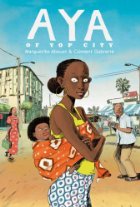 Country:
Country: Ivory Coast Côte d'Ivoire, West AfricaAuthor: Marguerite Abouet (& Clement Oubrerie)Review: Yes, yes, another coming of age novel. But I had to think about this one, because (a) it's not All About Me, and (b) it's a graphic novel. It's about three young women in the Ivory Coast Côte d'Ivoire of the 1970s, three fairly ordinary young women in a working class neighbourhood (Yopougon), who are having the usual teenage girl-issues, like school and boys and what to do with what's going on between their legs. It's called Aya, and that's the main character -- or rather the narrator -- but as Aya's a pretty dull person really (at least at this point in her life -- she's studying too hard to generate any real drama in her life) the story really focusses on the actions of her two friends Bintou and Adjoua.Comment: All the reviews about this book, as well as the preface, make a point of talking about the ordinariness of the story, the lack of violence and abjectness in the background, the total unAfricanness of the story (because nobody dies, no government topples, and nobody starves). To do the same thing would justify that stance and underline the idea that what happens in Africa must be very very bad. Everyone makes the point of saying that Ivory Coast Côte d'Ivoire was an exemplary African nation in the 1970s, etc, etc, rather the way Alexander McCall Smith keeps reminding us that Botswana is an exemplary African nation in the 2000s. It's the postcolonial version of the Dark Continent myth. I don't buy it, so I won't say it. But for people expecting fireworks and drama in this graphic novel, and who approach it the way they might approach, say, Speigelman's Maus, forget it. Think Archie, Betty and Veronica -- only all grown up.
 Country: Côte d'Ivoire, West AfricaAuthor: Marguerite Abouet (& Clement Oubrerie)Review: This is the continuation of the story started in Aya, about the three friends from Youpougon, the working-class neighbourhood of Côte d'Ivoire of the 1970s, three fairly ordinary young women in a working class neighbourhood (Youpougon, in Abidjan), and their teenage lives. The first book ends with the birth of Aya's friend Adjoua's son, who's supposed to be fathered by a rich boy, to whom Adjoua's engaged to be married. The second book opens with the picture of the child, who is in fact the image of his real father -- a goodlooking goodfornothing by the name of Mamadou. The stories pick up and follow the lives of the girls, meandering through various byways, including Aya's visit with her father to his work in another village, and Bintou's affair with an apparently rich man. And yet nothing's as good as it seems.In fact, the theme of this book could be the faithlessness of men. Almost every man in the book is flawed, and the women are either their victims or their saviours. It's a lighthearted look at life in Youpougon, and well worth the money I paid for it, but when all is said and done there are enough clichés for the African/Caribbean woman to fill a book.Comment: I read this book just in case -- in case I couldn't get through all of the African books I'd aimed to, and I'm glad I did so. That takes me to four of the six I aimed for. I have to say: Ngugi has swamped me, and I'm not going to finish his book, or the Challenge, by 2009. Abouet's work, though, is well worth following.
Country: Côte d'Ivoire, West AfricaAuthor: Marguerite Abouet (& Clement Oubrerie)Review: This is the continuation of the story started in Aya, about the three friends from Youpougon, the working-class neighbourhood of Côte d'Ivoire of the 1970s, three fairly ordinary young women in a working class neighbourhood (Youpougon, in Abidjan), and their teenage lives. The first book ends with the birth of Aya's friend Adjoua's son, who's supposed to be fathered by a rich boy, to whom Adjoua's engaged to be married. The second book opens with the picture of the child, who is in fact the image of his real father -- a goodlooking goodfornothing by the name of Mamadou. The stories pick up and follow the lives of the girls, meandering through various byways, including Aya's visit with her father to his work in another village, and Bintou's affair with an apparently rich man. And yet nothing's as good as it seems.In fact, the theme of this book could be the faithlessness of men. Almost every man in the book is flawed, and the women are either their victims or their saviours. It's a lighthearted look at life in Youpougon, and well worth the money I paid for it, but when all is said and done there are enough clichés for the African/Caribbean woman to fill a book.Comment: I read this book just in case -- in case I couldn't get through all of the African books I'd aimed to, and I'm glad I did so. That takes me to four of the six I aimed for. I have to say: Ngugi has swamped me, and I'm not going to finish his book, or the Challenge, by 2009. Abouet's work, though, is well worth following.